I’m finally caught up on sharing book reviews, which means that this round-up is made up of books I read in the past month rather than organized by category. I am excited to share these reviews!
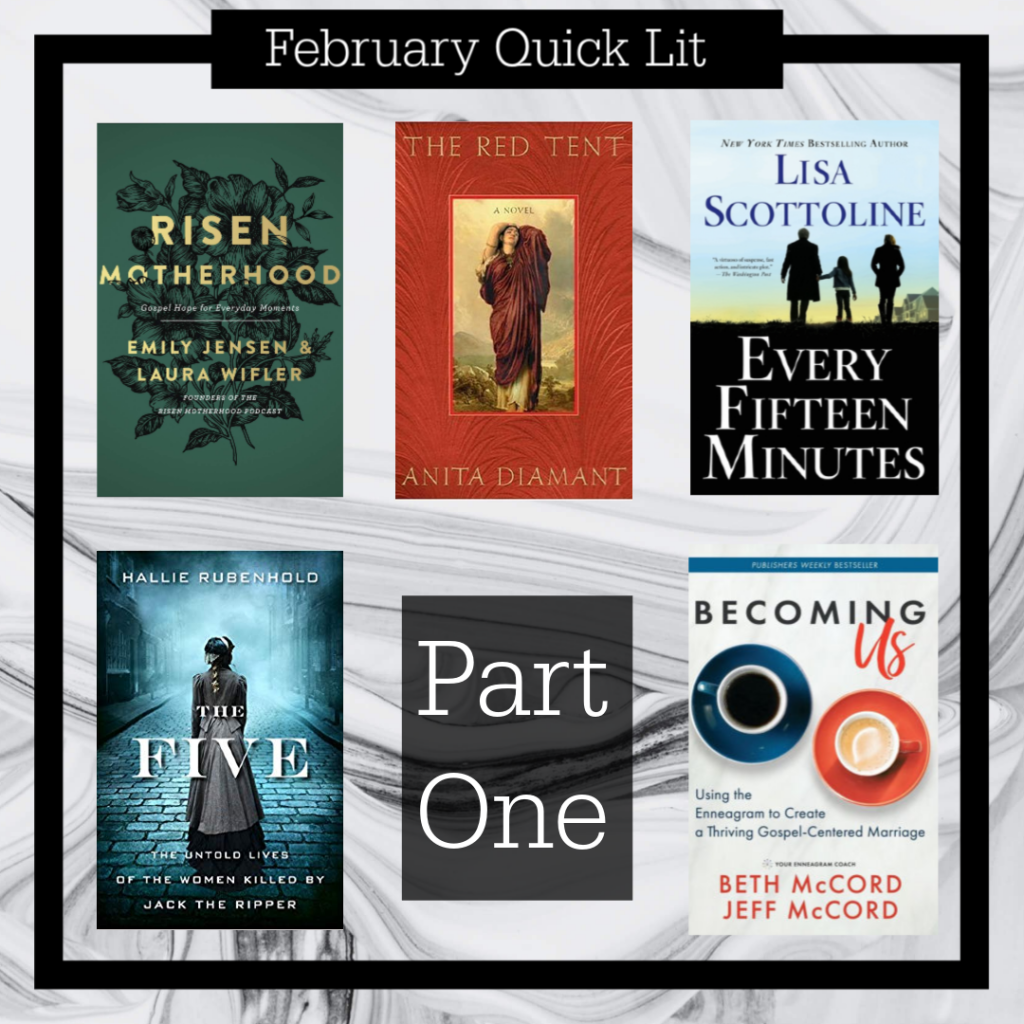
The Red Tent, by Anita Diament: For years I’ve seen this book popping up on lists of top book club selections and personal favorites. It’s not a book I would have chosen for myself as I’m not a big fan of historical fiction that dates so far back, but when my online book club chose it for our next read, I decided to join them.
The Red Tent is loosely based on the Biblical character of Dinah, the daughter of Leah and Jacob and sister to Joseph. The book begins with a history of Jacob’s wives, including how they each became part of Jacob’s family and the children they bore him; these are the stories Dinah grew up hearing, sitting in the red tent with her mothers during their monthly menstrual retreat. The novel goes on to share Dinah’s story, from growing up among many brothers to her “defilement” by a young prince (the story she is known for in Scripture) to her time spent in Egypt as a midwife. The novel dips in and out of Biblical stories, expanding on characters and storylines described in Scripture while adding many more.
This is not at all the book I expected it to be. For one thing, it is not “Christian Fiction” as I had assumed. The author is actually Jewish, and her interpretation of the Biblical stories strays pretty far from the source material in some interesting and often disappointing ways. I was surprised by the frank discussion of bodies (from menstruation to circumcision) as well as the graphic sexual scenes—all in line with Biblical stories, but still a little strange to be reading in such explicit terms. While I enjoyed seeing some of the Biblical characters fleshed out (particularly Jacob’s wives), I didn’t care for the secularization of these characters, with almost no mention of God and how faith played into each character’s actions and motivations. There is much more discussion of polytheistic practices and pagan worship, which I found to be an unnecessary imbalance.
The first part of the book (Dinah’s backstory) was the most interesting to me because I enjoyed making comparisons with the Biblical narrative; I imagine these chapters would be fairly boring for someone not familiar with the Bible. While Dinah’s love stories (the focus of Parts Two and Three) are obviously intended to be the heart of the novel, I personally wasn’t invested in Dinah or her experiences and found her to be a rather unlikable protagonist.
I can understand why fans of historical fiction may love this novel, but it wasn’t a personal favorite. I didn’t care for the writing style and felt there were too many characters and too much odd blending of history and modern interpretation. Still, I’m glad to have read it to learn what the hype is all about, and I’ll admit that I learned a great deal about cultural ideas and practices of ancient Israel. And discussing it with my book club made the reading experience a more enjoyable one.
My Rating: 3 Stars.
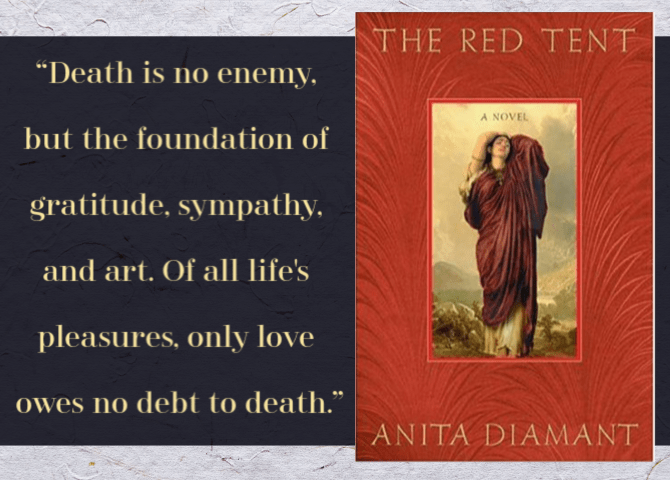
Risen Motherhood: Gosepl Hope for Everyday Moments: by Emily Jenson and Laura Wifler: If you’ve spent any time as a follower of Christ, you are familiar with the story of the Gospel. And if you’re like me, it’s easy to think of the Gospel in terms of salvation. It’s harder to think about its application in everyday life, especially when it comes to parenting. Emily Jenson and Laura Wilfer are two young moms with eight kids between them, and in this book they share their own journey and inspire other moms to pursue the Gospel within common motherhood issues.
The book begins with a clear presentation of the Gospel, followed by chapters exploring its application to specific areas of motherhood, from relationships to body image to schooling to food choices. Emily and Laura strip away false motives and cultural expectations to examine the ways we can experience grace within our decisions and focus on what is truly important in raising our children. Their discussion is convicting at times, as it reveals the sinful nature in many of our actions and choices, but ultimately each chapter points us back to Christ and the freedom and forgiveness we have in Him.
I used to be a faithful listener of the Risen Motherhood podcast but stopped listening because I struggled to relate to the hosts’ “precious” approach to motherhood and their overly spiritual take on parenting. There is some of this same pedantic tone in the book, too, but for some reason I found it easier to stomach in book form than I did in a podcast. (Perhaps because I tend to view books as aspirational by nature whereas I need more relatability in a podcast?) Overall I found this book extremely helpful as I learn how to bring what I know about God into my everyday life and especially as I aim to extend my faith to my children. I honestly had never thought of the Gospel’s implications for a number of the topics discussed in the book, and Risen Motherhood has helped me to view daily parenting in a new and helpful light.
My Rating: 4 Stars.
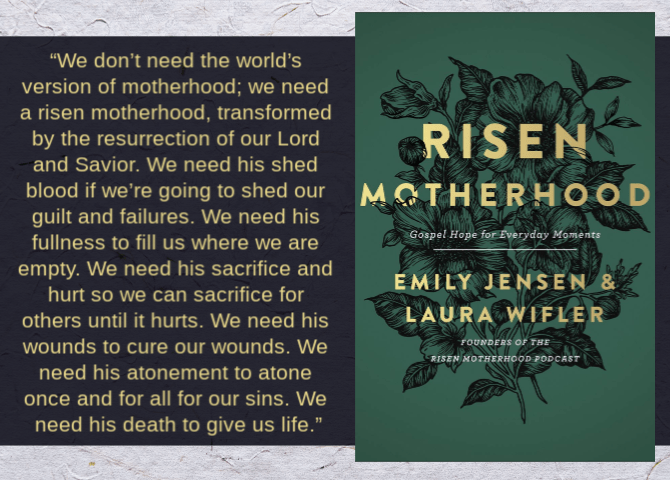
Becoming Us: Using the Enneagram to Create a Thriving Gospel-Centered Marriage, by Beth and Jeff McCord: One might think that I would tire of reading books about the Enneagram, but it honestly hasn’t happened yet. Each one offers a unique perspective on the model, providing me with new ways to think about the types and how the system applies to me and those around me. This Enneagram book is unique in that it focuses not just on teaching the Enneagram, but on its application to relationships between husbands and wives.
In Part 1 of Becoming Us, Enneagram coach Beth McCord and her pastor husband, Jeff, share their own relationship story and the ways they have grown in their faith and their relationship thanks to the Enneagram. They also discuss the childhood messages of each type and how these play out in relationship, then explore different communication styles and dig into ways that conflict can be a catalyst for improved relationship. While not entirely original, I found it helpful to see these principles laid out so succinctly. I also LOVED the focus on the Gospel and the repeated emphasis that growth in ourselves and our relationships cannot occur without Christ working in us. Many of my Christian friends’ hangup with the Enneagram is that it can come across as self-driven, but the McCords make it clear that the Enneagram is simply a tool, and one that is not especially helpful apart from the Gospel.
Part 2 of the book is an Enneagram roadmap with incredibly thorough descriptions of each type including behavior tendencies, conflict styles, and ways to affirm, love, and improve communication with your spouse based on his or her type. These sections address various aspects of the Enneagram including wings, stress and growth paths, detailed paths for growth, childhood wounds, and levels of alignment with the Gospel. This roadmap was one of the most helpful I’ve come across in my time studying the Enneagram, and it described both Luke’s and my types (5 and 1) more accurately than any other Enneagram book I have read. I would have liked to see a discussion of the subtypes, as well as explanations of the various triads, but even without these components, the guide is incredibly helpful.
This book would be an excellent introduction to the Enneagram, but it is also helpful for those who have spent years studying the system and are looking to apply it in a context beyond personal growth. It would be a great book for couples to read together.
My Rating; 4.5 Stars.
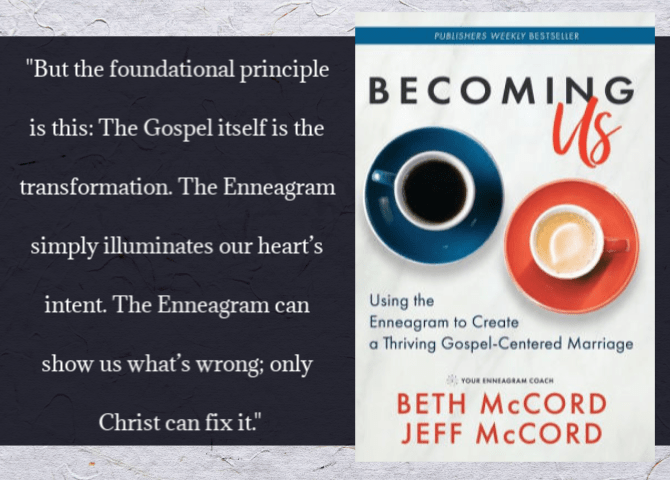
The Five: The Untold Lives of the Women Killed by Jack the Ripper, by Hallie Rubenhold: When tragedy strikes, the media (and therefore the public) often focuses on the culprit: the gunman in a mass shooting, or the husband who killed his wife, or the terrorists that take countless lives. It is easy to sensationalize the enemy, so it is the enemy who captures our attention. Unfortunately, the victims often go unacknowledged, their lives becoming overshadowed by the circumstances of their deaths. Such is the case for the five women killed by Jack the Ripper. Polly, Annie, Elizabeth, Catherine and Mary-Jane were all murdered in 1888, and for over a century, the five women have all been portrayed as debauched prostitutes. In The Five, historian Hallie Rubenhold sets out to redeem these women from this label and also to explore their lives apart from their deaths.
The book tells these women’s stories, one at a time, tracing their lives from cradle to grave. Each woman faced hardship in various forms and was the victim of difficult circumstances long before becoming a victim of Jack the Ripper. Alcoholism, homelessness, spousal abuse, and poverty are all present and, sadly, their plights were not uncommon for lower class women during the Victorian era. Through their stories I learned a great deal about the hardships faced by individuals—particularly women—in London during the late nineteenth century. In fact, it is the in-depth portrayal of this time period that stood out most to me in this book, and it has me wanting to learn more about the underbelly of the Victorian era.
I appreciate the author’s purpose in writing this book (to bring these five women to life, distancing them from the circumstances of their deaths), so I can understand the lack of information about their murders or even about Jack the Ripper. However, part of me (probably not a very good part, to be honest) was left wanting more of the grizzly details, simply because they might have added a little more intrigue to this well-written but occasionally dry historical book (something I don’t spend a lot of time reading). I recognize that I’m probably not the intended audience for a book like this and am sure those who read more historical biographies would find this book well-written and researched, and deeply engaging.
Besides the fact that the book isn’t as engrossing as I expected it to be, I am not sure that Rubenhold delivered on her attempts to prove that these five women were not prostitutes. From the information the author herself has presented, it seems apparent to me that these women each DID resort to prostitution as a means of survival. However, this is not something to be overlooked or vilified; rather than revising history, let’s acknowledge the truth of these women’s plights and offer empathy for their lack of alternative options. Even if these five women were prostitutes, that was simply a part of who they were (just as the fact that they were Jack the Ripper’s victims is only a portion of each of their stories).
This was an interesting read, and in this era of victim spotlighting, I’m not surprised that it’s gotten so much attention. I’m glad that these five women are finally being honored in some way, but question whether this is how the women themselves would have wanted their stories told.
My Rating: 3.5 Stars.
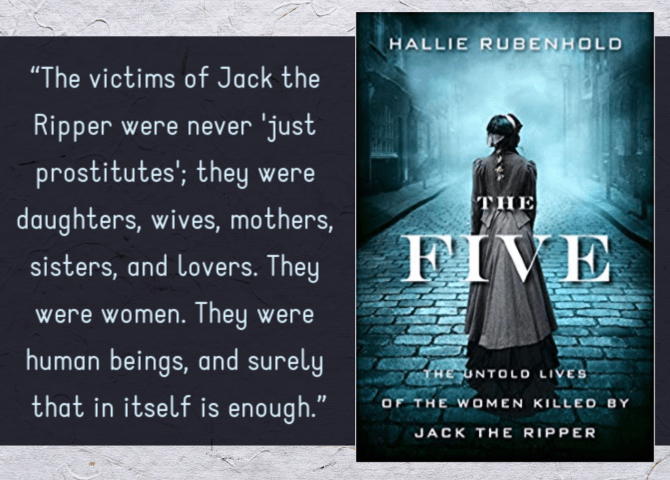
Every Fifteen Minutes, by Lisa Scottoline: Dr. Eric Parrish is at the peak of his career as the Chief of a Psychiatric Unit in a Philadelphia hospital. Unfortunately, his personal life is in shambles, with his wife having recently filed for divorce and now trying to distance him from their young daughter. Soon, his career is also threatened when Max, a teenage patient whom he is treating for OCD, goes missing after his crush is found dead. Eric embarks on a search for Max, but in attempting to protect his client, he inexplicably becomes a person of interest in the girl’s murder. Further jeopardizing his career are the false allegations he is facing for a trumped up charge of sexual harassment. It seems as though someone is determined to ruin Eric’s life, but who? And how is his downfall connected to the undisclosed second narrator who self-identifies as a sociopath set upon the ultimate act of destruction?
This is a very readable (if not particularly well-written or original) thriller with plenty of juicy twists. I was slightly bothered by the mental illness stereotypes, and while the unreliable narrator serves to maintain the suspenseful tone, I found it pretty cheesy. Still, the book is entertaining with a protagonist I could root for and a refreshing lack of vulgarity (something I really appreciate in Scottoline’s writing).
My Rating: 3.5 Stars.
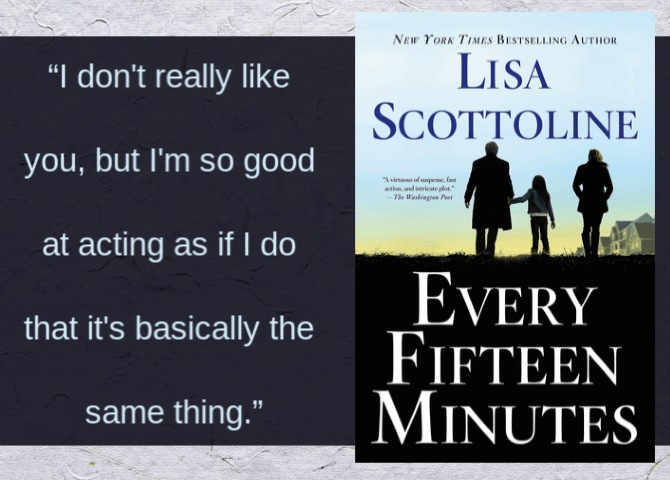
One Wednesday I’ll be back with reviews of six more books I read this month. Until then, happy reading!